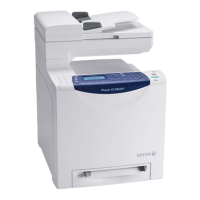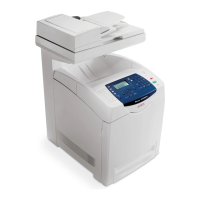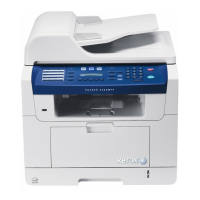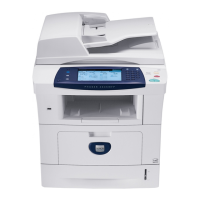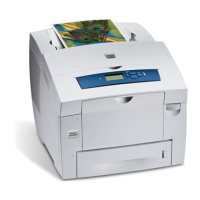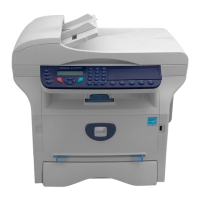3-54 Phaser 6121MFP Service Manual
Error Messages and Codes
Using the Troubleshooting Procedures
1. Applicable Status Code(s) lists the error message(s) addressed by each
troubleshooting procedure.
2.
Applicable Parts and Wiring and Plug/Jack References assist you in locating
information available for a particular part or procedure.
3. Follow each
step in a troubleshooting procedure sequentially in the order
given until the problem is fixed or resolved.
4. The
Actions and Questions box instructs you to perform a certain action or
procedure. Also included are precautions and/or additional procedures you
must follow to isolate the problem.
5. Some actions are followed by a question. If your response to the question is
Yes, then follow the instructions for a Yes reply. If your response to the
question is No, then follow the instructions for a No reply.
6. Note that two types of photo sensors are used: photo-reflective and photo-
receptive. Photo-reflective sensors use light reflected back from an object to
detect its presence or absence. Photo-receptive sensors use an actuator or the
object itself to block the light path to detect an object or condition.
7. Troubleshooting procedures frequently ask you to take voltage readings or
test for continuity or resistance at certain test points. The
Wiring and Plug/Jack
References
table provides pointers to the diagrams that provide this
information.
8. Troubleshooting procedures often ask you to replace a printer component.
When instructed to replace a non-spared component and that component is
part of a parent assembly, replace the entire parent assembly.
Measurement Techniques
1. Unless indicated otherwise, the instruction “switch On printer power” means
for you to switch On printer power and let the printer proceed through Power
On Self Test (POST) to a ‘Ready’ condition.
2. Conventions used in this manual to represent connectors.
3. When instructed to take voltage, continuity or resistance readings on wiring
harness, proceed as follows; Check P/J 232–1 to P/J 210–5 by placing the red
probe (+) of your meter on pin 1 of P/J 232, and place the black probe (–) of
your meter on pin 5 of P/J 210.
4. When you are instructed to take resistance readings between “P/J 232 <=>
P/J 210” (without specified pin numbers), check all pins. Refer to the section
“Wiring Diagrams” for the location of all wiring harnesses and pins.
5. When you are instructed to run a test, run the Service Diagnostics test
associated with the component being examined.
6. When you are instructed to take a voltage reading, the black probe (–) is
generally connected to a pin that is either RTN (Return) or SG (Signal Ground).
You can substitute any RTN pin or test point in the printer, and you can use FG
(frame ground) in place of any SG pin or test point.
7. Before measuring voltages make sure the printer is switched On, the Imaging
Unit and the paper trays are in place, and the interlock switch is actuated,
unless a troubleshooting procedure instructs otherwise.
8. All voltage values given in the troubleshooting procedures are approximate
values. The main purpose of voltage readings is to determine whether or not a
component is receiving the correct voltage value from the power supply and if
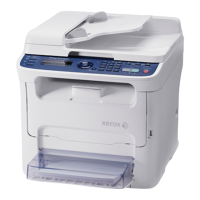
